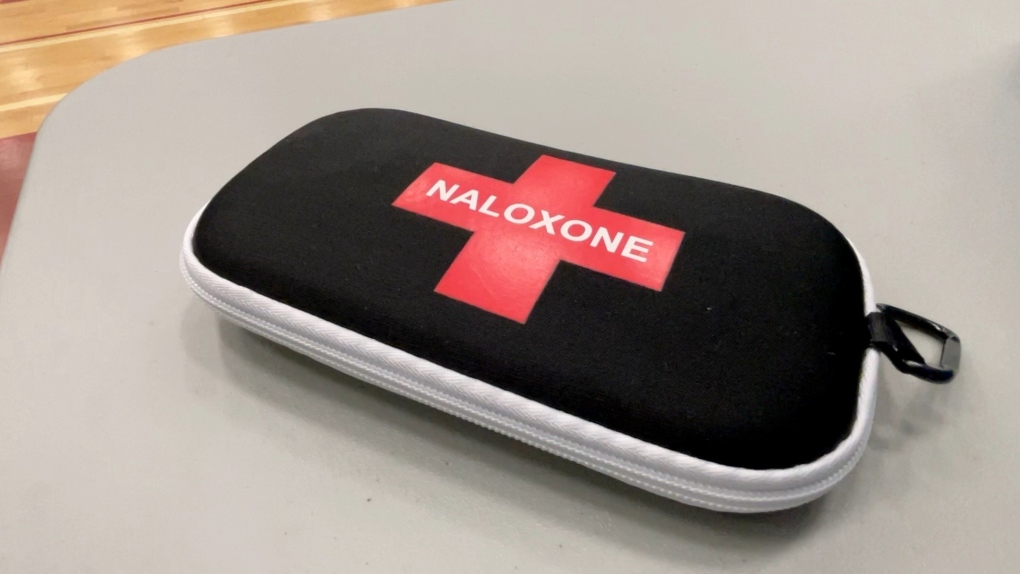Ottawa high school students trained on overdose response
Ottawa high school students are learning a skill that could one day could potentially save the life of a family member, friend—or even a stranger.
New data reveals that only 18 per cent of Ontarians are confident they could help someone experiencing a suspected opioid overdose, according to a survey conducted by Innovative Research Group.
The Advanced Coronary Treatment (ACT) Foundation is expanding their High School CPR & AED programs to include opioid overdose response.
“We’re training all young people so they’ll be empowered to save lives,” said Sandra Clarke, the ACT Foundation Executive Director.
The ACT Foundation is expanding this training to nearly 80 per cent of Ontario high schools over the next three years.
"With the opioid crisis that we face across the country, the ACT foundation … is training teachers to teach their students in CPR, how to use an AED, and now also how to respond to a suspected opioid overdose," Clarke said.
Hydro One is providing support to help make that happen.
“We know that there is an opioid crisis, especially after the pandemic, when we consider the impact on mental health and so on; so, we jumped at the chance support them,” says Jay Armitage, Hydro One V.P., of Marketing & Communications.
On Wednesday morning, students at St. Francis Xavier High School were practicing and showing their CPR skills and opioid overdose response knowledge.
"In today’s world, drugs are becoming much more popular within teens, so it made sense for them to come out with something that could reduce the deaths,” says Nick Gilroi, Grade 10 student at the school.
“It actually only took me 30 minutes, we just learned it yesterday; how to give Naloxone kits, super simple - I was very surprised," says another Grade 10 student, Nicole Gauthier.
The training teaches students what opioids are and how do overdoses happen, how to recognize a suspected overdose; as well as, what is Naloxone and how does it work.
The ACT Foundation developed the opioid overdose response training module for high schools based on a successful Ottawa pilot project in 2019.
 A naloxone kit at St. Francis Xavier High School. (Peter Szperling/CTV News Ottawa)
A naloxone kit at St. Francis Xavier High School. (Peter Szperling/CTV News Ottawa)
Earlier this year, ACT began rolling out the training to Ontario high schools, providing teachers with critical resources to educate students about how to recognize and respond to a suspected opioid overdose, including the use of nasal Naloxone.
“The training that they’re receiving is completely normalized; and, the students - they’re trained to react to any situation where someone needs help," said Sean Power, St. Francis Xavier School principal. "This is how we want our students, our young people to react in these situations,”==."
The training is free for high schools across Canada.
CTVNews.ca Top Stories

Celine Dion delivers stirring comeback performance at Paris Olympics opening ceremony
Against the rainy Paris night sky, Celine Dion staged the comeback of her career with a powerful performance from the Eiffel Tower to open the Olympic Games.
Jasper wildfire: 'Several weeks' before residents can return, premier says
Premier Danielle Smith said Friday afternoon in Hinton while weather conditions are cooler, the Jasper fire is still considered out of control and that Jasper residents can expect to be away from their homes 'for several weeks.'
Missing 3-year-old boy found dead in creek in Mississauga, Ont.: police
A three-year-old boy has been found dead a day after he went missing in a park in Mississauga, Ont., Peel police say.
Irish museum pulls Sinead O'Connor waxwork after just one day due to backlash
An Irish museum will withdraw a waxwork of singer-songwriter Sinéad O'Connor just one day after installing it, following a backlash from her family and the public, it told CNN in a statement on Friday.
Winnipeg senior's account overdrawn for $146,000 water bill
A Winnipeg senior is getting soaked with a six-figure water bill.
Turpel-Lafond won't sue CBC over Cree heritage report that took 'heavy toll': lawyer
The lawyer for a former judge whose claims to be Cree were questioned in a CBC investigation says his client is not considering legal action against the broadcaster after the Law Society of British Columbia this week backed her claims of Indigenous heritage.
Driver charged after flashing high beams at approaching police
Orillia OPP arrested and charged a driver with impaired driving after flashing their high beams.
Major Canadian bank experiences direct deposit outage on payday
Scotiabank says it has fixed a technical issue that impacted direct deposits on Friday morning.
FBI says Trump was indeed struck by bullet during assassination attempt
Nearly two weeks after Donald Trump’s near assassination, the FBI confirmed Friday that it was indeed a bullet that struck the former president’s ear, moving to clear up conflicting accounts about what caused the former U.S. president’s injuries after a gunman opened fire at a Pennsylvania rally.
































